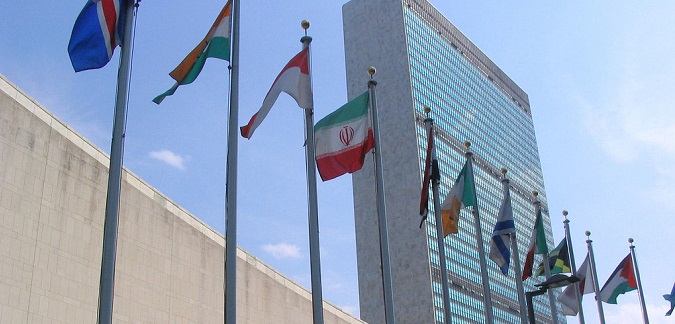Iranian state media is crowing that it has been elected by a vote of the United Nations General Assembly to be the rapporteur of the U.N.’s Disarmament and International Security Committee. The election, according to Iran’s state-linked Fars news agency, was a defeat for the “Zionist regime representative” who had urged member states to reject the appointment. According to the U.N., the committee’s mandate is broad:
It considers all disarmament and international security matters within the scope of the Charter or relating to the powers and functions of any other organ of the United Nations; the general principles of cooperation in the maintenance of international peace and security, as well as principles governing disarmament and the regulation of armaments; promotion of cooperative arrangements and measures aimed at strengthening stability through lower levels of armaments.
The election has generated controversy. Iran is in violation of half a dozen U.N. Security Council resolutions related to its nuclear program, which the U.N.’s nuclear watchdog suspects of including work on nuclear warheads. It has provided critical military assistance to the Bashar al-Assad regime in Syria, which Damascus leveraged to extend the conflict and eventually to launch a mass chemical weapons attack.
According to the First Committee’s website, Khodadad Seifi, an Iranian Deputy Ambassador to the United Nations, will be the official acting as Rapporteur. Recent statements by Seifi have not instilled in analysts the confidence that he will be forthright about proliferation issues. Responding this week to Israeli Prime Minister Netanyahu’s General Assembly speech, Seifi asserted that Iran “continues to fully cooperate with the IAEA.”
Iran continues to fully cooperate with the IAEA and all its nuclear activities are carried out under surveillance cameras of the Agency and its resident inspectors who regularly visit all nuclear sites and measure and seal enriched uranium containers… As a result, non-diversion of declared nuclear material in Iran has always been confirmed by all reports of the Agency. The latest IAEA report, dated 28 August 2013, states that “the Agency continues to verify the non-diversion of declared nuclear material at the nuclear facilities declared by Iran under its Safeguards Agreement.”
Iran does not fully cooperate with the IAEA, and in fact refuses to cooperate on a numbers of levels. The agency’s last report described several “unresolved military nuclear issues.” Among other things, Iran continues to deny the IAEA access to Parchin, where it is suspected that Iranian scientists carried out work relevant to nuclear detonations.
Iran was so unhappy with IAEA report that it issued a harsh and insulting response to the IAEA.
Seifi’s elevation to rapporteur will deepen skepticism regarding the efficacy of multilateral nonproliferation forums, especially those that include as members rogue regimes that are on the brink of triggering a Middle East-wide arms race.
[Photo: Ashitakka / Flickr]




